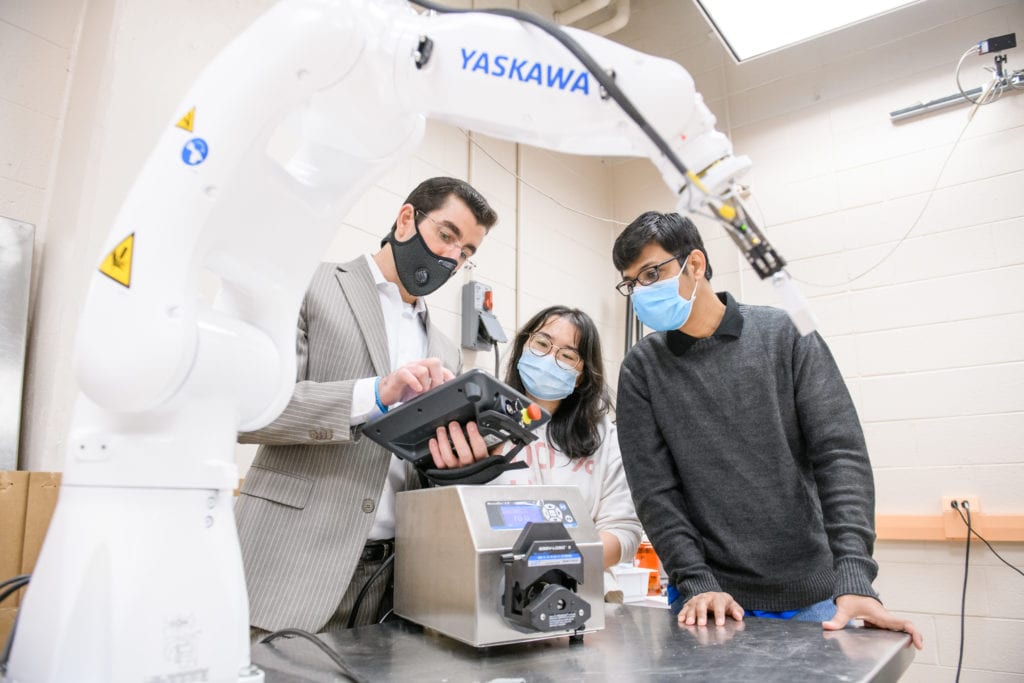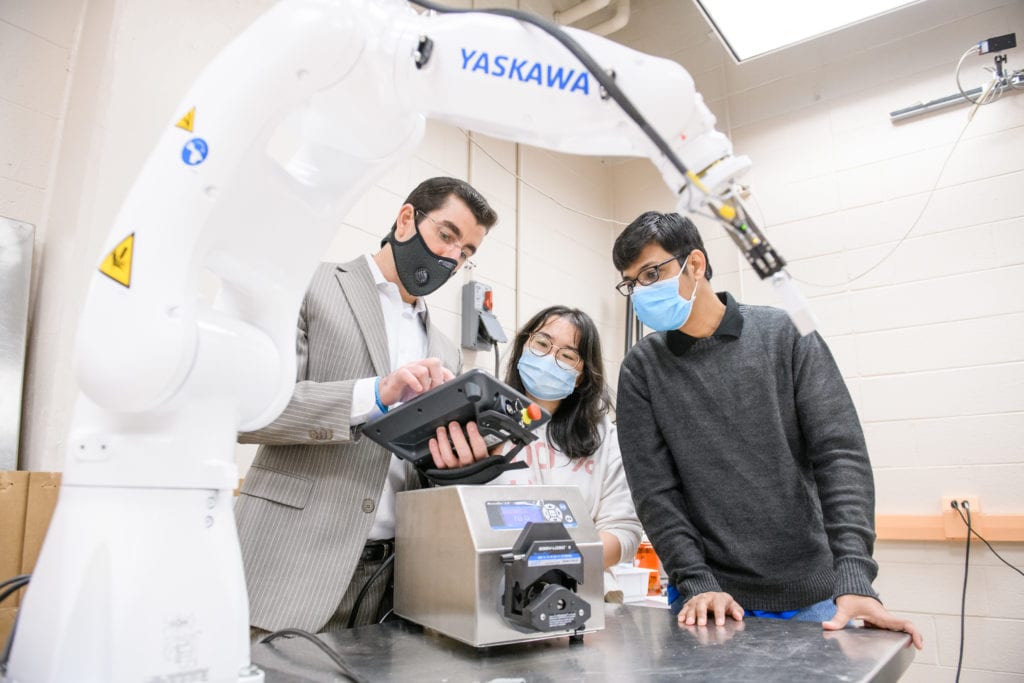Clemson, Nephron driving pharmaceutical manufacturing with new benchtop industrial robot

Drug shortages have plagued the health care system for decades. Even prior to COVID-19, hospitals incurred more than $400 million in labor costs and alternative treatment options due to national generic drug shortages, especially for those administered via injection.
More important, research shows shortages lead to adverse patient outcomes – things like delaying critical procedures, rationing doses based on supply levels and prescribing suboptimal treatment plans with substitute drugs.
Manufacturing tops the list as the most common cause of shortages, pushing those in the pharmaceutical supply chain to look for new ways to increase productivity – and thanks to a partnership between Clemson University and Nephron Pharmaceuticals Corporation, a solution may be on the horizon.
Led by Dr. Yue “Sophie” Wang, the ambitious project combines robotics and medicine to ensure sterility, quality, safety and efficiency in pharmaceutical manufacturing. The team worked in partnership with South Carolina-based Nephron Pharmaceuticals Corporation to develop a flexible, easy to use, open-source benchtop robot that can fill, cap and seal sterile syringes.
“Pharmaceutical collaborative robots is a new and quickly growing research area,” said Wang, who serves as the Warren H. Owen Duke Energy Associate Professor of Engineering at Clemson University. “By combining our expertise with unique applications in pharmaceutical manufacturing, we hope to benefit both patients and the industry through increased efficiency in syringe manufacturing.”
The project supports the Nephron 503B Outsourcing Facility, a cGMP manufacturer providing sterile, pre-filled medications to address persistent drug shortages in hospitals and medical facilities across America. Pre-filled syringes help control costs by minimizing drug overfill and minimizing microbial contamination. Without robotics, filling these syringes is a delicate, highly regulated process completed by specialized technicians under laminar airflow hoods in ISO classified clean rooms to keep their work environments sterile.
It can take up to five employees a day per hood to meet the incredible demand for pre-filled syringes at Nephron. Unlike humans, robots don’t get tired, offering advantages in quality control, production planning and compliance.
Technicians can then be re-deployed for higher value functions that let them improve their skills, experience and pay, said Nephron CEO Lou Kennedy.
“Anything we can do to improve drug shortages, that’s just good for patients,” she added. “It’s a very big crisis, not just in the U.S. but globally as well.”
The next phase of the project is further development, starting with the completion of a purpose-built clean room on Clemson’s campus. Kennedy hopes to commercialize the benchtop system for use inside healthcare facilities across the country.
“Hospitals often have two or three pharmacists working the phones every day searching for the drugs they need,” said Kennedy. “You don’t go to school for eight years to spend your day on the phone looking for product.”
Partnering for change

Clemson and Nephron are at the forefront of a larger trend shaping pharmaceutical manufacturing today. The integration of automation, AI and robotics are catalyzing the industry, and rising demand paired with major market disruptions such as COVID-19 are only accelerating change. The pharmaceutical robotic systems market is expected to nearly double to $119.46 million from just five years ago, driven by innovations in packaging, inspection and lab work, according to one report.
Part of what has made the project successful is the complementary strengths Nephron and Clemson brought to the table. Wang needed an insider’s perspective on pharmaceutical manufacturing to understand the exact requirements and processes involved in sterile syringe production.
Based in West Columbia, Nephron is a certified woman-owned business and one of the fastest-growing companies in South Carolina. The partnership was developed through External Affairs’ Office of Corporate Partnerships and Strategic Initiatives at Clemson University.
“As a leading pharmaceutical manufacturer, Nephron is the perfect partner for specialized, high-impact research to improve health outcomes for patients,” said Angie Leidinger, Clemson’s vice president for External Affairs. “Thanks to our partners, our breakthrough research continues to build Clemson’s and South Carolina’s reputation for leadership in both advanced manufacturing and life sciences.”
In addition to Clemson’s world-class research talent, Nephron was also drawn to the University’s steady stream of talented graduates that could hit the ground running at their facilities.
“We’re a young company and want to play a role in developing all of this great talent we have around us,” said Kennedy. “I decided it was time to put game day feelings aside and look at where our talent was really coming from.”
Women taking the lead
Like most STEM industries, women continue to be a minority in the pharmaceutical manufacturing workforce, at 42.3 percent of total employment. If the partnership between Clemson and Nephron is any indication, that gap could be shrinking fast.
With Kennedy at the helm, Nephron is a certified woman-owned business and boasts a 53 percent female workforce. Ratios like that are unheard of in our industry, she says. It’s only fitting that project leadership from the Clemson side is female.
Clemson is home to many groundbreaking women in the industry, including Martine LaBerge as chair of the Department of Bioengineering, Saara DeWalt as chair of the Department of Biological Sciences, and Delphine Dean as the Ron and Jane Lindsay Family Innovation Professor, among many others. Dean is also a key researcher and first line of defense in the University’s response to the global pandemic.
“It’s so pleasant to see women thriving in STEM careers,” said Kennedy.
The post Clemson, Nephron driving pharmaceutical manufacturing with new benchtop industrial robot appeared first on Clemson News.
Click Here for the Full Article
Author: Ashley Boncimino







